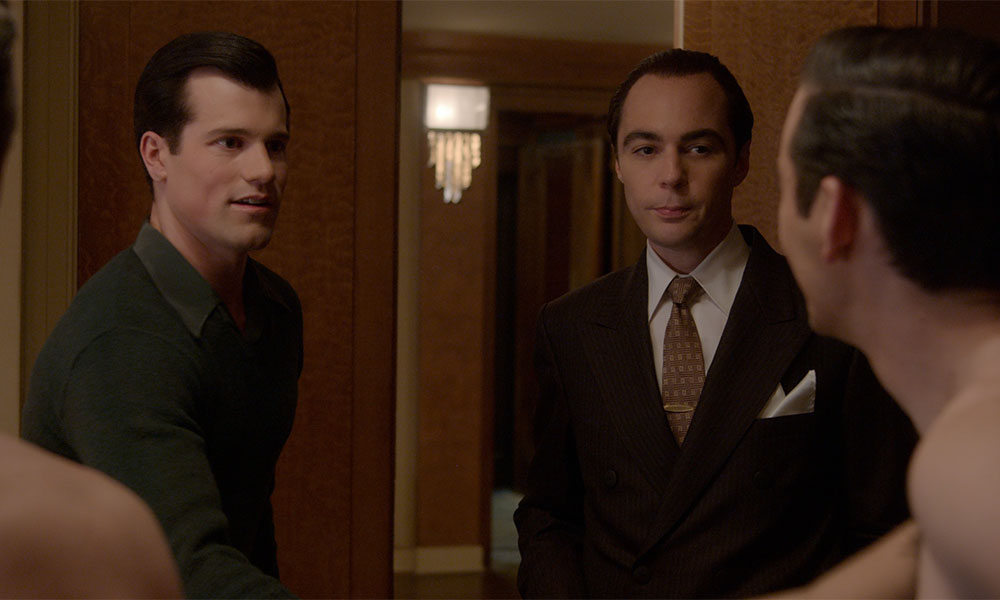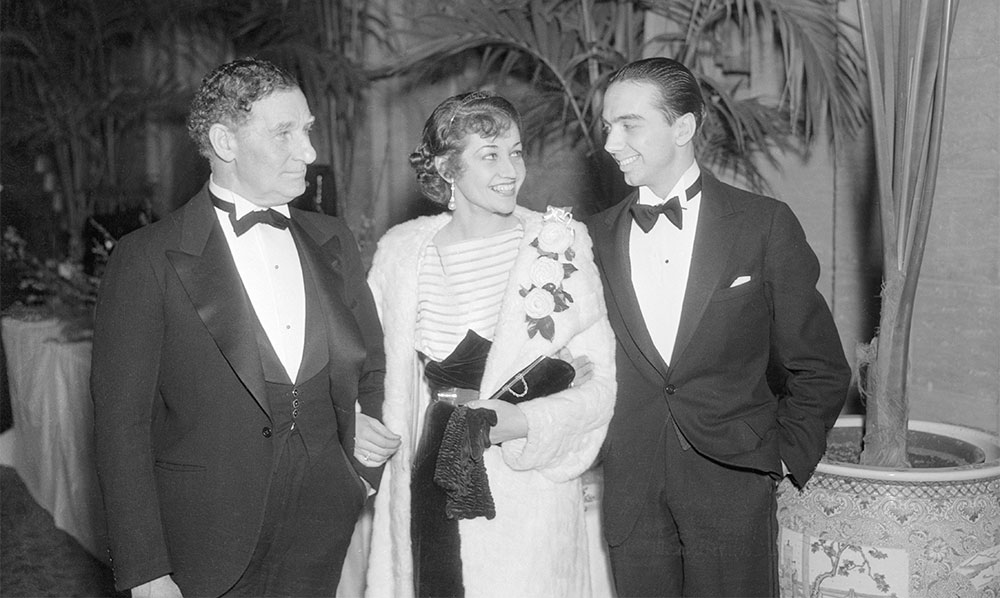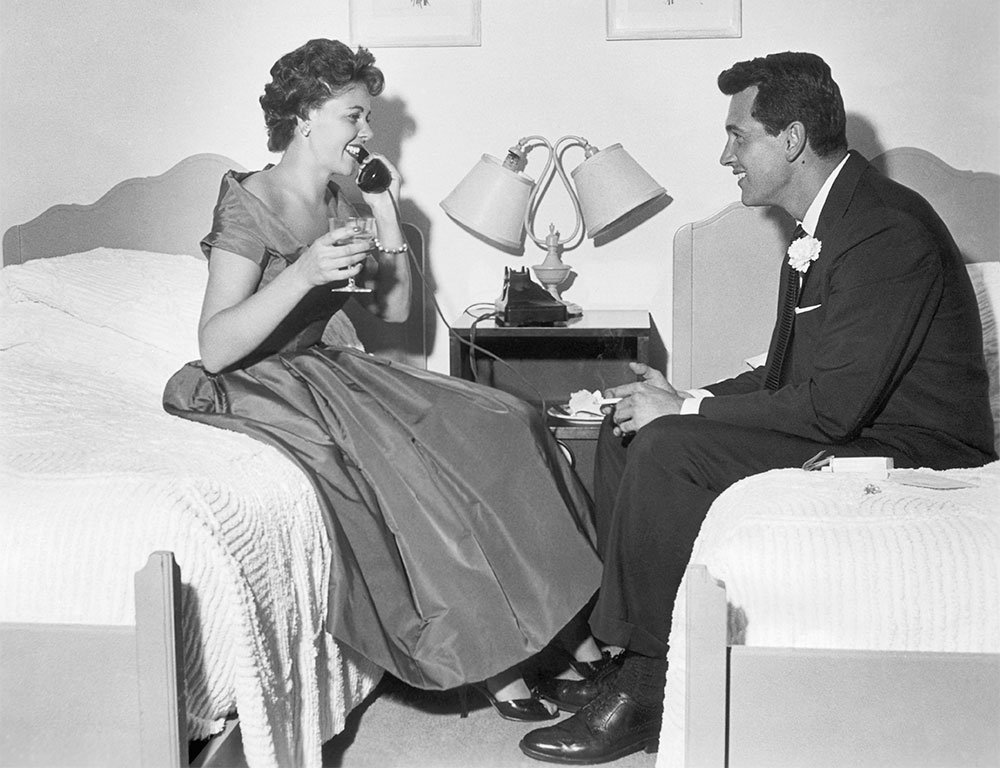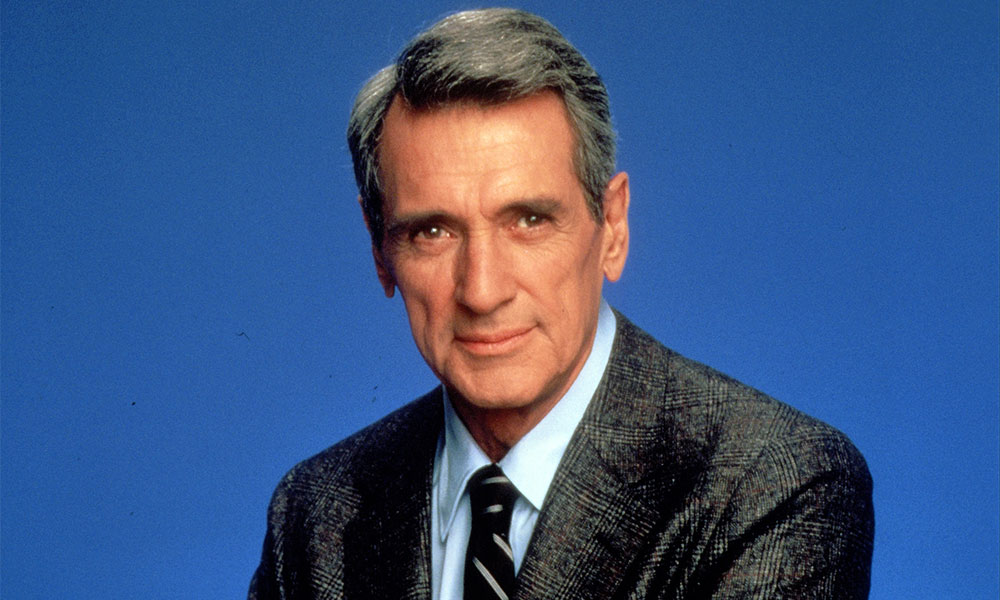The tragic true story of Rock Hudson, Hollywood’s dazzling closeted heartthrob, and his sexually lecherous agent Henry Willson

Rock Hudson kept the fact that he was gay secret throughout his life. (Getty)
Rock Hudson, the gay heartthrob who defined an era, is given an alternate, happy fate in Hollywood, Ryan Murphy’s new Netflix series.
Hollywood imagines what might have happened if, in the post-war era, queer people, women and people of colour were allowed to succeed in Tinseltown.
The Netflix series is by large a creation of Murphy’s, but among the made-up names are a few real-life ones, including Rock Hudson, the gay actor who tragically died of AIDS-related complications in 1985.
He was the first major celebrity to come out as living with HIV, and in doing so, one of the first major gay actors to acknowledge his sexuality (at the time, HIV was still – wrongly – thought of as an LGBT+ condition).
Rock Hudson was created Rock Hudson in 1947, his name dreamed up by Willson. A year earlier, in 1946, 21-year-old Roy Harold Scherer Jr had moved to Hollywood shortly after his discharge from the US Navy, with dreams of becoming an actor.
There Scherer met the man who would make him a star, and who had a penchant for preying on handsome young wannabes.
Rock Hudson was a gay actor who remained in the closet all his life.
“[Willson] was a tormented gay man who preyed on tormented gay men,” Ryan Murphy, creator of Hollywood, told Vanity Fair
“He would be their manager and make them sexually service him.”
According to legend, this is just what happened to Scherer. Willson took him to bed and rechristened him Rock, for the rock of Gibraltar, and gave him the surname Hudson, after the river.

Jake Picking plays Rock Hudson and Jim Parsons plays Henry Willson in Hollywood. (Netflix)
As Hollywood retells, it took a village to create Rock Hudson. A dentist gave him a new marquee-ready smile to bolster his already dashing good locks, tailors cut him new suits to flatter his 6’5″ frame, a vocal coach taught to speak in a deeper, more ‘masculine’ voice.
According to biographer Robert Hofler, Willson would smack Hudson’s wrists to stiffen them up when they fell limply and would slap his hips to stop them from swaying.
“Signs of femininity had to be eradicated,” Jake Picking, who plays Rock Hudson in Hollywood, told Advocate. “His wrist was slapped, hips straightened this way, never cross your legs, fix your teeth, lower voice, all this stuff.”
An acting coach was drafted in to teach him the craft from scratch – by all accounts, Hudson was as far from a natural as can be.
His first part came in the 1948 war film Fighter Squadron. He had one line: “You’ve got to buy a bigger blackboard,” which took him 38 takes to nail, an ordeal retold in Hollywood.

Henry Willson, left, with daughter-father actors Paula Stone and Fred Stone. (Getty)
Henry Willson arranged for Hudson to marry.
Despite his shortcomings, Hudson became a leading man in 1954 with Magnificent Obsession. With his new-found fame came intense scrutiny into his private life.
In 1955, Life magazine ran a cover story on Hudson’s permanent bachelorhood, with the headline: “Fans are urging 29-year-old Hudson to get married — or explain why not.”
Around the same time, Confidential magazine threatened to out Hudson. Willson sprang into action, selling two other clients out to the rag in exchange for its silence.
“Henry Willson knew that there was only one way to silence all of the rumours about Hudson’s homosexuality,” Mark Griffin wrote in his 2019 biography All That Heaven Allows.
It was time for Rock to get married. And fast.
Before the year’s end he had married Phyllis Gates, Willson’s secretary and an aspiring actor herself.
The marriage did the job, and by 1957, Hudson received an Oscar nomination for his work in Giant, having supplemented his chiselled looks with hard-earned acting nuance.
It was around this time that the marriage fell apart – though it remains unclear whether this was because Gates knew Hudson was gay.
His public image remained untarnished throughout and after the divorce, but within a few years his relationship with Willson had broken down.

Rock Hudson with his wife Phyllis Gates. (Getty)
By 1966 Willson was in the grips of alcoholism and was beginning to impact Hudson’s career negatively.
“He eventually got a bad reputation and lost what lure of power he had to keep clients around,” Parsons told Vanity Fair.
Eventually Hudson fired Willson. By 1974 the once kingmaker was unemployed and destitute, and was placed in hospital where he remained until 1978, when he died of liver cirrhosis.
Though Hudson and Willson never reconciled, the actor sent him a cheque for $20,000 to help him during his illness.
“They hadn’t spoken for years, and had a very cantankerous relationship after they split up — Henry talked badly about him and vice versa,” Parsons said.
“But even so, he always acknowledged somewhere in his heart and mind that Henry was a major part of why he became the success he was.”
Rock Hudson died from AIDS complications.
As years went by Hudson continued to act, until June 1984, when he visited a doctor about an irritation on his neck. This transpired to be a symptom of Kaposi sarcoma, a cancerous tumour that affects people with AIDS.
A year later in July 1985, he publicly announced that he was living with the virus, becoming the first major celebrity to do so, and tacitly acknowledging his sexuality for the first time, HIV/AIDS being (wrongly) thought of at the time as something which only affected the LGBT+ community.
Hudson spent his final few months surrounded by friends and friends. According to Griffin, one such friend, George Nader, wrote anonymous letters to four of Hudson’s lovers.
Tragically, Hudson died on October 2, 1985 aged 59. His death prompted an outpouring of grief across Hollywood, and has been credited with changing attitudes towards the AIDS crisis.
Shortly after his death, People magazine wrote: “Almost overnight, stimulated by massive media coverage, the US came to a consensus: AIDS was a grave danger to the national health, and something had to be done about it—fast.”

Rock Hudson shortly before his death in 1985, of AIDS complications. (Getty)
It noted that after Hudson had revealed his status, more than $1.8 million in private contributions to support AIDS research and to care for AIDS victims had been raised, more than double the amount of the previous year.
A few days after his death, the US Congress announced it was setting aside $221 million to develop a cure. According to Hollywood’s Picking, it is this along with his “persistence and progression” that remains Hudson’s legacy.
“I think that’s what the show was about, without giving anything away,” he told Forbes.
“He didn’t care about other people’s opinions. That’s something we could all strive to more of. You know?
“Certain battles with women, LGBTQ and queer community, its so deep-waged today. It’s a triumphant show to watch during this quarantine, too. And I hope its inspiring, too.”

